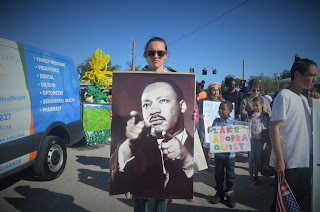Apopka Celebrates Martin Luther King Day

Nezahualcoyotl Xiuhtecutli
Last Monday January 15 the nation celebrated the life and work of Dr. Martin Luther King, Jr. Born in Atlanta in 1929, Martin Luther King followed in the steps of his maternal grandfather and father in becoming a spiritual leader. While working on a doctorate in theology, he became pastor of a rural church in Alabama in 1953 and earned his PhD from Boston University in 1955. Dr. King was involved in the struggle for Civil Rights beginning in the 1950s until he was assassinated in Memphis in 1968. Dr. King understood that the fight for racial equality was inextricably linked to economic justice. Not surprisingly, at the time of his death he was in Memphis advocating for the rights of sanitation workers who were on strike.
Addressing the Southern Christian Leadership Conference in 1967, King wrote,
"We must recognize that we can't solve our problem now until there is a radical redistribution of economic and political power… this means a revolution of values and other things. We must see now that the evils of racism, economic exploitation and militarism are all tied together… you can't really get rid of one without getting rid of the others… the whole structure of American life must be changed. America is a hypocritical nation and [we] must put [our] own house in order."
Apopka came out to celebrate this day with a parade that included members of this diverse community in a parade that promoted the racial equality and mutual respect for which King advocated.

In the last few years, and especially since the 2016 presidential election we have seen some of the issues against which King fought resurface in American society, such as racial tension. While recent awareness of the issues different communities of color face has given resurgence to terms like "cred," the words of Martin Luther King about the challenges the Civil rights Movement faced resonate today. In his 1967 work, Where Do we Go from Here: Chaos or Community?, King reflected on the need for a cooperation from white society that essentially required a more humble approach and willingness to learn:
"Whites, it must frankly be said, are not putting in a similar mass effort to reeducate themselves out of their racial ignorance. It is an aspect of their sense of superiority that the white people of America believe they have so little to learn. The reality of substantial investment to assist Negroes into the twentieth century, adjusting to Negro neighbors and genuine school integration, is still a nightmare for all too many white Americans…These are the deepest causes for contemporary abrasions between the races. Loose and easy language about equality, resonant resolutions about brotherhood fall pleasantly on the ear, but for the Negro there is a credibility gap he cannot overlook. He remembers that with each modest advance the white population promptly raises the argument that the Negro has come far enough. Each step forward accents an ever-present tendency to backlash."
Of course, he understood that his work for social justice was responsible for his being labeled an extremist. He eventually came to realize that the pursuit of justice in an unjust system would naturally seek to stop a movement that ran counter to its interests. Writing from a Birmingham jail he addressed his fellow clergymen who had themselves branded him an extremist. From that letter that came to define his work for history comes this excerpt,
"[T]hough I was initially disappointed at being categorized as an extremist, as I continued to think about the matter I gradually gained a measure of satisfaction from the label. Was not Jesus an extremist for love: “Love your enemies, bless them that curse you, do good to them that hate you, and pray for them which despitefully use you, and persecute you.” Was not Amos an extremist for justice: “Let justice roll down like waters and righteousness like an ever-flowing stream.” Was not Paul an extremist for the Christian gospel: “I bear in my body the marks of the Lord Jesus.” Was not Martin Luther an extremist: “Here I stand; I cannot do otherwise, so help me God.” And John Bunyan: “I will stay in jail to the end of my days before I make a butchery of my conscience.” And Abraham Lincoln: “This nation cannot survive half slave and half free.” And Thomas Jefferson: “We hold these truths to be self-evident, that all men are created equal ...” So the question is not whether we will be extremists, but what kind of extremists we will be."

As we prepare for the fight ahead in 2018 for racial, economic, social, and environmental justice let's take a moment to reflect on the life of a man who half a century ago put his life on the line in the fight for justice, and who saw one without the others would only be a shallow victory. As we go forward, let us reflect on what has changed since then, and what hasn't, and what we can do to bring about the future we want for ourselves and for our children.
If you would like to read more about the life of Martin Luther King, Jr, follow this link and visit the website of the King Center. If you live in the Atlanta area or plan to be there in the future, visit the different places that honor the legacy of this man.
The National Park Service has information on places to visit in the Atlanta area where you can learn more about the life and labor of Martin Luther King, Jr., including his birth home.





Comments
Post a Comment